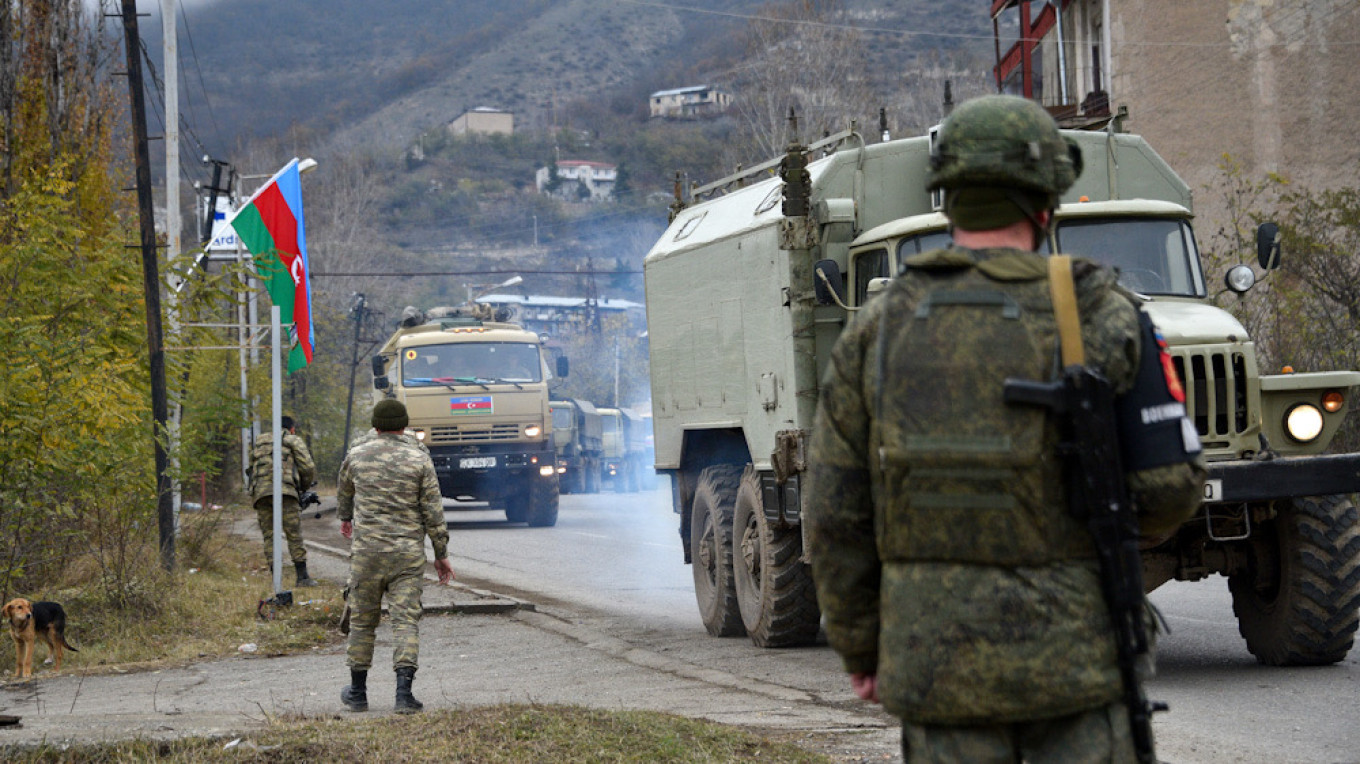
The Azerbaijani takeover of Lachin, the last of three districts handed back by Armenia under a deal to stop fighting over Nagorno-Karabakh, ends the first stage of a Russian-brokered peace process.
But the decades-old dispute over Karabakh, an ethnic Armenian region that broke away from Azerbaijan during a war in the 1990s, is far from resolved.
Here’s what to expect next:
Return to homes
Armenia agreed to hand over three districts — Aghdam, Lachin and Kalbajar — as part of the November deal that stopped an Azerbaijani offensive that saw Baku reclaim swathes of territory lost to Armenian separatists in the war.
Lachin was ceded on Tuesday, Kalbajar on Nov. 25 and Aghdam on Nov. 20.
Azerbaijan won back four other districts during the fighting and is now in control of all seven around Karabakh that Armenian forces seized in the 1990s as a buffer zone.
Tens of thousands of Azerbaijanis who fled these districts are expected to return, though Baku says the desolate areas first need to be made habitable by clearing landmines and rebuilding infrastructure.
The separatists are retaining control over most of Karabakh’s Soviet-era territory and there too residents are returning.
Up to 90,000 people fled Karabakh during the fighting — some 60% of the population.
Russia, which deployed peacekeepers under the deal, is helping them to go home and said Tuesday more than 26,000 had returned.
Living side-by-side
Nearly 2,000 Russian soldiers have been deployed for a renewable five-year mandate to keep the peace between the two sides.
Oil-rich Azerbaijan has vowed to invest huge sums in rebuilding the reclaimed districts, but the economic future of the Karabakh Armenians is far less certain.
The region has long relied on financial help from Armenia, itself struggling with a weak economy.
How Azerbaijan, Armenia and the separatist authorities will work together is also an open question, and tensions are sure to arise.
“The Moscow-brokered agreement… is ambiguous on a number of aspects such as the mandate of Russian peacekeepers and how the life of the local population, both Armenian and Azerbaijani, will be organized,” says Olesya Vartanyan of the International Crisis Group.
“In case the ambiguity persists, that will be potentially a source of tensions and destabilization.”
What future for Karabakh?
The agreement also does not spell out how the most difficult question will be dealt with: Karabakh’s long-term future.
Decades of talks chaired by France, Russia and the United States — the so-called Minsk Group — failed to find a political settlement over the region’s status.
Russia’s crucial role in ending the latest fighting has moved it to the forefront and Azerbaijan is very keen for key ally Turkey to be involved in mediation efforts.
The credibility of the Minsk Group is also being called into question, in particular by Azerbaijan which last week lashed out at France after its Senate passed a resolution calling for the recognition of Karabakh as independent.
How Azerbaijan, Armenia and the separatist authorities will work together is also an open question, and tensions are sure to arise.
“The Moscow-brokered agreement… is ambiguous on a number of aspects such as the mandate of Russian peacekeepers and how the life of the local population, both Armenian and Azerbaijani, will be organized,” says Olesya Vartanyan of the International Crisis Group.
“In case the ambiguity persists, that will be potentially a source of tensions and destabilization.”
What future for Karabakh?
The agreement also does not spell out how the most difficult question will be dealt with: Karabakh’s long-term future.
Decades of talks chaired by France, Russia and the United States — the so-called Minsk Group — failed to find a political settlement over the region’s status.
Russia’s crucial role in ending the latest fighting has moved it to the forefront and Azerbaijan is very keen for key ally Turkey to be involved in mediation efforts.
The credibility of the Minsk Group is also being called into question, in particular by Azerbaijan which last week lashed out at France after its Senate passed a resolution calling for the recognition of Karabakh as independent.
Experts say a different diplomatic format may be possible and that the new status quo could present an opportunity as a major sticking point in talks — the return of the seven districts around Karabakh — has been removed.
But mistrust in the region runs deep and decades of enmity will be hard to overcome.
